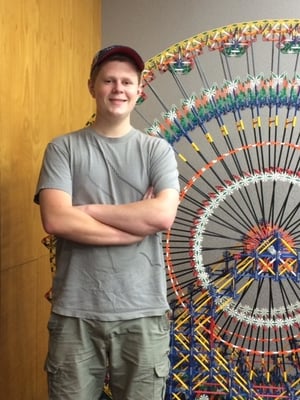In the heyday of manufacturing in America, internships and apprenticeships were highly sought out job experiences. Students knew the skills they gained during an internship could help shape their future success.
Since the mid-1960’s, however, the industry and the employment picture has taken some big hits. It has only been in the past five years, that we have seen manufacturing output and jobs begin to grow again.
During the time in between, the manufacturing workforce has gotten older, and the factory floor has evolved. Today’s manufacturing facilities are highly automated, clean and lean work environments where technical skills are highly regarded and rewarded.
Dream It. Do It., a campaign launched by The Manufacturing Institute, is on the front lines of this perception shift. Coordinating activities and best practices across the county Dream It, Do It is creating opportunities for young people to experience engineering principles and practices first hand. There are other initiatives and programs throughout the country educating young people, parents, and educators about manufacturing skills and careers.
Manufacturing companies offer a wide range of career paths, from hands-on operations to design engineering. Gaining intern experience in these companies can help students focus their education and interests. And it helps build a resume.
The summer is winding down and with it, our internships at The Rodon Group. This summer we had three interns, two of which are specifically targeting careers in manufacturing. These students were encouraged by one of their professors, to take advantage of the intern opportunities at manufacturing companies in our region.
We had the opportunity to talk to our interns before they went back to college to get their feedback on their experiences working in a factory environment.
Steven Yost - Manufacturing Intern, Third Shift
Background: Steven Yost is enrolled in the Engineering Program at Montgomery County Community College. With two semesters under his belt, Steven plans to get his Associates Degree in Engineering Sciences. This general degree will help Steven determine which engineering field he want to pursue before choosing one discipline. He is considering continuing his education at Drexel, Penn State or Ohio State.
Why manufacturing/engineering? Steven comes from a long line of engineers, and this increased his interest in the field. “Everyone said in high school that engineering was the field to pursue. I know a lot of people in engineering, plus I like knowing how things work. Both my uncle and my grandfather were engineers.”
Why Rodon? “I looked at the website, and it looked interesting.” After submitting his resume, Steven was hired for the third shift. This internship was his first job and the first time in a factory setting. He was trained to be a machine, operator.
What skills have you gained? “How to deal with stress. A lot happens here at once. You need to know how to manage your time. In the machine operator’s position, you need to be able to troubleshoot. Most time, when a buzzer goes off, I can fix the problem myself.”
How will these skills benefit you in the future? “I can use them in manufacturing or everyday life. I learned time management and how to deal with stress.”
Garret Rees - Manufacturing Intern, First Shift
Background: Garret grew up in North Wales and attended the North Montco Technical Career Center. He is pursuing a Mechanical Engineering Associates degree at Montgomery County Community College.
Why manufacturing/engineering? While Garret said he is unsure about which path he will take, having hands-on experience in a manufacturing environment exposed him to future possibilities. He may continue onto to a four-year school to get a bachelor's degree or may go to a professional skills school to learn a trade such as tool building or welding.

Why Rodon? Garret was attracted to this internship because it gave him a perspective on engineering and manufacturing. He toured the plant with the Student Engineering Association and he liked what he saw.
What skills have you gained? “Overall, it is to have a full-time job and learn how to work hard and take pride in my work. I’m not just working at a pizza shop. I’m doing something meaningful and have a better understanding of how things are made. As a machine operator, you learn problem-solving skills that can be applied in any environment."
How will these skills benefit you in the future? “I understand the process of being hired and what a professional company expects from their employees.”
Internships are an educational experience
Throughout the country, factory floors, labs, and even sales offices at manufacturing companies are training and mentoring students. These internships are mutually beneficial for both the manufacturer and the trainee. The company benefits long-term if the intern returns after graduation. The intern gains valuable experience and skills they can apply in the future.
Many Fortune 100 companies such as Chevron, Apple and GE invest heavily in their intern and co-op programs. This investment can lead to full-time employment once the student graduates. All positions are paid and many come with benefits including accrued vacation time.
The much talked about skilled labor shortage is very apparent in companies that need people with skills in science, technology, engineering and math (STEM). Manufacturing companies may be facing a critical shortage in years to come. Co-op and intern jobs give students the opportunity to secure their future success before they start their careers.









Comments